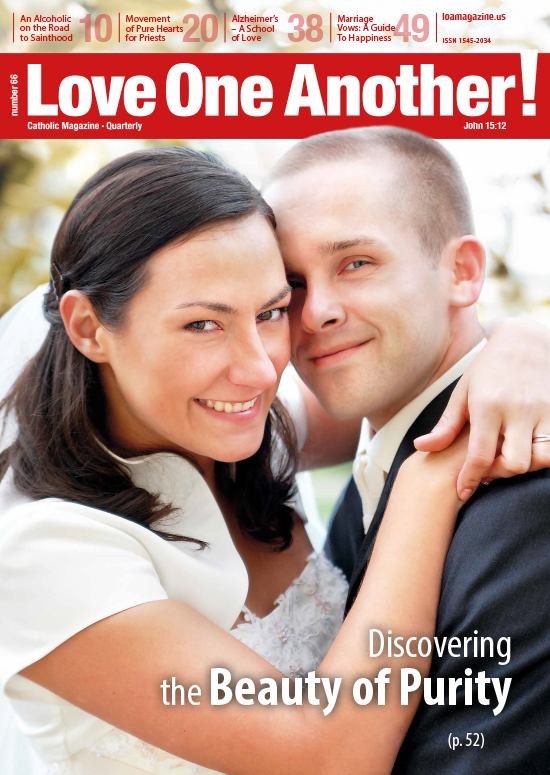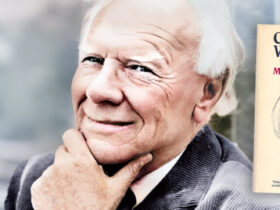In the school of the Holy Family – on humility (part 1)

A Christian acknowledges that everything good comes from God. Humility means siding with the truth; it is the realisation that what I have is a gift from God and mine are only sin and misery.
The opposite of humility is pride. When I am proud, I appropriate for myself the gifts I have received to serve others, and I usurp something that belongs to God. In the school of the Holy Family, we learn humility, without which there is no love. For love is humble.
The most perfect example of humility is the Holy Family: Jesus, Mary and Joseph. Jesus, who, as God, led a hidden life in Nazareth, invites us to imitate him: “learn from me; for I am gentle and humble in heart” (Matt. 11:29). He, the Creator of the universe, becomes a real man, a defenceless child, a poor carpenter, for us and our salvation. He will continue His humble life until the Cross: He, the Almighty God, allows himself to be tied, spat on and scorned, and finally nailed to a cross. “[He] emptied himself, taking the form of a slave, being born in human likeness” (Phil. 2:7).
Pondering Christ’s lesson in humility, in the Apostolic Exhortation Redemptoris custos, St Pope John Paul II also recalls the person of Saint Joseph. St Joseph teaches us through his attitude to be a saint: you don’t need to achieve great things; it is enough to possess ordinary virtues and truly live them!
St John Paul II frequently spoke of Mary’s humility: “This humility – humility of spirit and surrender in faith – was expressed in a special way in her fiat: ‘Here am I, the servant of the Lord; let it be with me according to your word’. (Luke 1:38) Thanks to Mary’s humility, the further words of the Magnificat could be fulfilled […]. At the time of the Annunciation, she probably didn’t fully understand the mystery of God’s plan, but she knew that it meant a complete change to the reality of her life. However, she didn’t ask, ‘Will this actually happen? Does it have to happen?’ Mary only asked, ‘How will this happen?’ Without doubts and reservations, she allowed God’s action to change her life. The question she asked of the angel expressed the humility of her faith – willingness to give her life in the service of the divine mystery, although she didn’t know how it would happen” (homily delivered on 1 November 2000).
Humility is the cornerstone of all virtues. St Augustine writes: “Are you intending to erect a magnificent building? Fine, but think first about the foundation of humility.” Any human intention must be well seated on the foundation of humility, so it can develop according to God’s plan. If we want our marriage to be happy, to be truly a happy family, and not only to be considered as such, we need to stand in the truth and to reject all falseness. A family’s happiness is based on the humility of its members. As spouses, we are to be an icon of the Holy Trinity, after the fashion of the Holy Family, to selflessly give and receive love, and to live with this mutual giving. From the beginning of their life together, spouses should fight their own selfishness, be aware that they are not self-sufficient, acknowledge the fact that only with God’s help can they make their family an environment facilitating the real growth of their children and themselves. The Holy Scripture often teaches about the need for humility: “God opposes the proud, but gives grace to the humble” (1 Pet. 5:5); “When pride comes, then comes disgrace; but wisdom is with the humble” (Prov. 11:2). We know from personal experience that a humble person attracts others, that it is pleasant to be in their company; but the opposite is also true – it is better to keep as far as away as possible from a proud person. Hence humility is so important in marriage and in the family. It is the foundation of unity. Without humility, there is no love, and it is very difficult to save the unity.
What happens in marriage when we neglect to work on ourselves and do not pray for the gift of humility? Arguments start, mostly caused by a struggle for power and the desire to get one’s way. Then the couple hurt each other, move apart and suffer, but most of all they hurt Christ. Their situation becomes even more complicated. It is much harder to find a solution in anger than in the light of faith. Rather than pursuing your own rights, using only human arguments, try throwing yourself with trust into the open arms of Jesus, who took upon himself the sins of all people. He also took upon himself our suffering, and now He is waiting to embrace us with his love. The “leap” into the arms of Jesus is a matter of our will. How to do this practically? First, confess all sins and negligence in the sacrament of penance, receive Jesus into your heart in Holy Communion, offer up to Him yourself, your spouse and the pain that your spouse has inflicted on you, trusting that He will bring every difficult situation into his most holy Sacrifice. Then a miracle of reconciliation will occur: the spouses will have the grace of repentance, the will to apologise and forgive.
What to do when one spouse falls and hurts the other? Jesus teaches us that evil can be overcome only with good, lies with truth, and
hatred with love. Therefore, you need to ask Jesus to help you accept the suffering that the spouse inflicts, and offer it to God. The Lord Jesus is waiting and invites us to come to him with all our problems. He says: “Come to me, all you that are weary and are carrying heavy burdens, and I will give you rest. Take my yoke upon you, and learn from me; for I am gentle and humble in heart, and you will find rest for your souls.” (Matt. 11:28–29).
The marriage union is the perfect place to grow in humility. The spouses’ souls are like rough diamonds, which must be processed to form precious diamonds. There are various situations in which God uses this diamond cutting to teach us humility. We asked Pawel and Agnieszka what it is like for them. They are a loving people, kneeling together to pray, the parents of four children, for years involved in forming the Movement of Families of Nazareth. They often experience difficult situations, through which God tempers their pride. Difficulties also tend to make them seek help from other people and ask for prayers of intercession. Agnieszka puts it like this:
“We always have different opinions, although we have a similar direction. In fact, we mean the same thing, but we present it in different ways, and there are often tensions. One example could be our last retreat away. We tried to do everything to make this trip happen! We wanted to go with our family to meet with God. Finally, everything was ready. I was sure we were going, and suddenly confusion! What happened? Worn out with packing, I didn’t get up as early as planned. My husband, who was set to leave at dawn, said that in that case we were not going. I couldn’t understand his attitude, and an argument broke out. Our trip was in question. So I began to pray very much in my heart, asking God for help. I fell on my knees only when our plans collapsed. In the end, we overcame that difficult situation in our marriage. But it was not the end of the trouble, because the car battery went flat. Again, God’s reminder: ‘without Me you can do nothing’. This breakdown mobilised us to the final change in attitude.
We want the same, we look in the same direction, but each of us has a different vision and, consequently, we cannot meet. Then there is nothing you can do but cry out to God and entrust to him the solution, because we can see that we cannot do anything ourselves. In this way, God shapes my humility, but I seldom see it right away. When the knocking is too weak, I don’t come out of my shell; when a stronger impact comes, the shell of pride breaks. It’s not for long, however, because it then gets restored, and I’m shut in it again, hiding like a tortoise. My pride is growing, and I’m sitting in this shell. I pity myself: ‘oh, poor me!’ I don’t immediately discover my pride, stubbornness, anger and focus on myself. God reminds me again: ‘without Me you can do nothing’. And at some point I begin to see how proud I am. Then I beat my chest (internally) and perform a volte-face, towards God. When there is not enough prayer, not enough cries for grace and not enough awareness that without Him we can do nothing, we forget about God, and sometimes we have to experience what we are capable of ourselves. In the end, I notice that He in His great mercy reminds us that we need to reach out, to beg for His mercy, because He desires our happiness most.” God always wants to pour His mercy on our family, on every family. He only needs to find in us the right attitude of humility, of hunger for His love.
Let us allow Christ to shape in us an attitude of humility, especially in difficult situations of conflicts, setbacks, weakness, helplessness etc. As parents responsible for the upbringing of our children, let us teach them the attitude of humility. Let us learn it from Jesus, who out of love for us “emptied himself, taking the form of a slave, being born in human likeness” (Phil. 2:7). Let us pray: “Jesus, meek and humble of heart, make our hearts according to your heart.”






